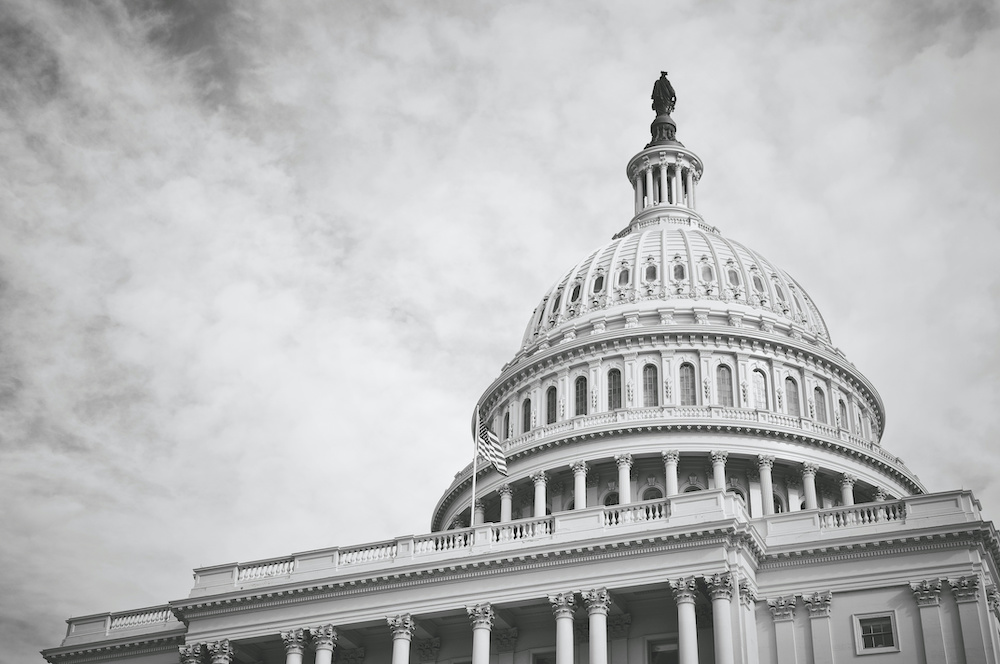
- Details
- By Elyse Wild
Congressional leaders left the White House on Monday afternoon after meeting with President Donald Trump without a deal that would avert a federal government shutdown at midnight on October 1.
Senate Minority Leader Chuck Schumer (D-NY) stated that Democrats and the White House still face "very large differences" regarding health care. He is worried that Republicans and the administration might reverse government funding already approved through rescissions.
"For the first time, the president heard our objections, and heard why we needed a bipartisan bill. Their bill has not one iota of Democratic input," Schumer said. "That is never how we've done this before."
Schumer said he and House Minority Leader Hakeem Jeffries "made to the president some proposals," and that "ultimately, he's the decisionmaker."
In preparation for the possible shutdown, the National Congress of American Indians (NCAI) held a webinar for over 1,000 tribal leaders and officials from across Indian Country on Monday afternoon. Tribal leaders and officials are concerned about the impact of a federal government shutdown on their tribal finances and services to citizens.
With trillions of dollars, millions of jobs and thousands of essential programs that help federally recognized tribes provide essential services to their citizens, we are taking a look at how one of the largest federal agencies in Indian Country will be affected: the Indian Health Service.
How did we get here?
It’s not usual for Congress to miss the deadline to pass the spending bill to fund nearly 440 federal agencies before the start of the fiscal year — October 1. However, in years past, lawmakers typically pass a temporary spending bill called a Continuing Resolution (CR) to keep the government moving until an agreement is reached. This year is different. Democrats who are concerned about health care and retirement budgetary impacts are not willing to pass a Continuing Resolution.
Today, Congress is facing off over $1.7 trillion of discretionary funding in the government’s $7 trillion spending bill. Much of the funds go to health and retirement funds.
House Republicans authored a short-term bill to fund the government through Nov. 21, but Democrats are urging the measure to address concerns on health care. They want to reverse the Medicaid cuts in President Donald Trump’s mega-bill, passed this summer and extend tax credits that make health insurance premiums more affordable for millions of Americans who buy coverage through the marketplaces established by the Affordable Care Act. If Congress cannot reach an agreement on the measure by tomorrow at midnight, government agencies will be required to cease non-essential operations and furlough non-exempt employees.
What does this mean for Indian Country?
For the Indian Health Service (IHS) and tribally run health programs, the answer is complicated.
While discretionary funds will be immediately affected by the shutdown, agencies that are funded through advance appropriations, such as the IHS, and direct appropriations, like the Diabetes for Indians program, will not be immediately affected. Six IHS accounts are not funded by advanced appropriations: Electronic Health Record System, Indian Health Care Improvement Fund, Contract Support Costs, Payments for Tribal Leases, Sanitation Facilities Construction, and Health Care Facilities Construction.
At the NCAI webinar,Tyler Scribner (Chickasaw Nation), CEO and Chief Data Officer of tribal sovereign data analytics, said the IHS will use prior year funds to retain staff for these programs through the impending shutdown.
Scribner said tribes would be largely affected by contract service costs and 105 lease payments. Contract service cost payments reimburse tribes for providing healthcare to their citizens, while 105 lease payments compensate tribes for the operating costs of tribally-owned facilities.
“That means no payments will be expected, and that a prolonged shutdown could result in a situation where you're not receiving those mandatory, obligated payments,” Scribner said. “Why? Because they're currently scored and treated as discretionary funding.”
Also at risk are Medicaid and Medicare reimbursements to IHS, which made up 13% of its funding last year.
“While those payments from those accounts are mandatory obligations, the staff to administer all those payments could be impacted,” Scribner said. “We don't know necessarily, at this moment, how much Medicare and Medicaid staff would be impacted.”
Elizabeth Carr (Sault Ste. Marie Tribe of Chippewa Indians), Vice President of Intergovernmental and Governmental Affairs at Cedar Rock Alliance, who served served as the first-ever Tribal Advisor at the White House Office of Management and Budget (OMB) during the Biden administration, told the NCAI webinar attendees that several factors distinguish the impending shutdown from those in years past.
A memo issued by the OMB )is encouraging federal agencies to issue reduction-in-force notices in the event of a shutdown to employees whose programs fall under lapsed discretionary funding, has no alternative funding, and do not align with the Trump administration's priorities. As well, the OMB has not made public a shutdown contingency plan.
“The OMB website, which normally publishes shutdown contingency plans, has been empty for months,” Carr said. “These contingency plans are really important to be transparent for the public and for folks who are implementing federal programs.
“It's already starting to differ in the lack of transparency in contingency planning being shared by OMB,” Carr said. “And also in the potential threat for reductions in force that's never been done before, and so that will really enhance the impacts on Indian country.”
More Stories Like This
‘You Are Never Alone’ | How One Tribe Is Fighting Youth Suicide With Culture and Crisis Response‘Our Culture is Prevention’
This National Cancer Prevention Month, Reduce Your Risk
New Mexico Will Investigate Forced Sterilization of Native American Women
USDA Expands Aid for Lost Farming Revenue Due to 2025 Policies


